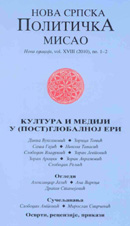| NSPM in English | |||
International Court Decision Could Encourage Separatists |
 |
 |
 |
| субота, 31. јул 2010. | |
|
(American Enterprise Institute 30. 7. 2010)
The ICJ decided that Kosovo's 2008 declaration of independence from Serbia "did not violate any applicable rule of international law." Although the world media first headlined that the court had approved Kosovo's actual independence, the real result was much more limited. The ICJ made it very clear it was merely providing an "advisory opinion" to answer the United Nations General Assembly's question whether Kosovo's declaration of independence was valid. And indeed, the ICJ decision has not really clarified the situation in the Balkans. While Kosovo's declaration of independence, according to the court, did not violate the applicable international law, the underlying, and far more important, issue is still unresolved: Is Kosovo legitimately independent or not? With the kind of external political support it has received for unilateral independence, why should [Kosovo] compromise on anything less? Serbia immediately rejected both the ICJ opinion and any broader conclusions about Kosovo's status. Belgrade held firm to its long-standing view that Security Council Resolution 1244 of 1999 expressly reaffirmed "the commitment of all Member States to the sovereignty and territorial integrity" of former Yugoslavia, and did not decide the "final status" of the province. T Therefore, Serbia argued, Kosovo remains part of Serbia until and unless the parties to the dispute agree otherwise. Russia and China, echoing Belgrade's position, have consistently said that Resolution 1244 simply provided a political framework to allow the parties to reach their own conclusions. By contrast, the European Union and the United States welcomed the ICJ decision. Unfortunately, Brussels and Washington have long held confused and inconsistent positions, simultaneously holding that Serbia and Kosovo should resolve the status issue by negotiation, while at every opportunity encouraging and assisting Kosovo's leaders to make their country independent. Small wonder that Kosovo has never shown much inclination to negotiate. With the kind of external political support it has received for unilateral independence, why should it compromise on anything less? Politically, Kosovo's continued de facto sovereignty means it has achieved essentially what it sought by declaring independence. But because Kosovo's independence was imposed on Serbia, rather than negotiated mutually, there is a basis for yet another unresolved Balkan conflict that could later return to haunt us. The larger, global implications are even more troubling, despite the very limited nature of the ICJ's advisory opinion. Even the Palestinian-Israeli conflict might be affected. Separatist regions in Europe and around the world will draw their own conclusions from the decision, thus precipitating unnecessary confrontations between separatists and central governments, but without any real guidance beyond the specifics of the Kosovo situation. Concerns about these potential ramifications undoubtedly shaped the positions not only of Russia and China, but even those of European nations like Spain, which faces several regional separatist movements. The real conclusion is that lasting, peaceful solutions to separatist conflicts ultimately can only emerge from agreements among the parties themselves. Until and unless they find the means to do so (or to live with them until a better idea arises), they are only postponing the day of reckoning. The blunt truth is that some will only be resolved by military conflict. But as its Kosovo opinion makes clear, the artificial and inadequate ICJ is probably the least useful approach of all. |
Од истог аутора
Остали чланци у рубрици
- Playing With Fire in Ukraine
- Kosovo as a res extra commercium and the alchemy of colonization
- The Balkans XX years after NATO aggression: the case of the Republic of Srpska – past, present and future
- Из архиве - Remarks Before the Foreign Affairs Committee of the European Parliament
- Dysfunction in the Balkans - Can the Post-Yugoslav Settlement Survive?
- Serbia’s latest would-be savior is a modernizer, a strongman - or both
- Why the Ukraine Crisis Is the West’s Fault
- The Ghosts of World War I Circle over Ukraine
- Nato's action plan in Ukraine is right out of Dr Strangelove
- Why Yanukovych Said No to Europe

.jpg)








 Last week's International Court of Justice decision on Kosovo could have a significant global effect. While there is less there than meets the eye in legal terms, how the ruling is read politically may be quite different.
Last week's International Court of Justice decision on Kosovo could have a significant global effect. While there is less there than meets the eye in legal terms, how the ruling is read politically may be quite different.











